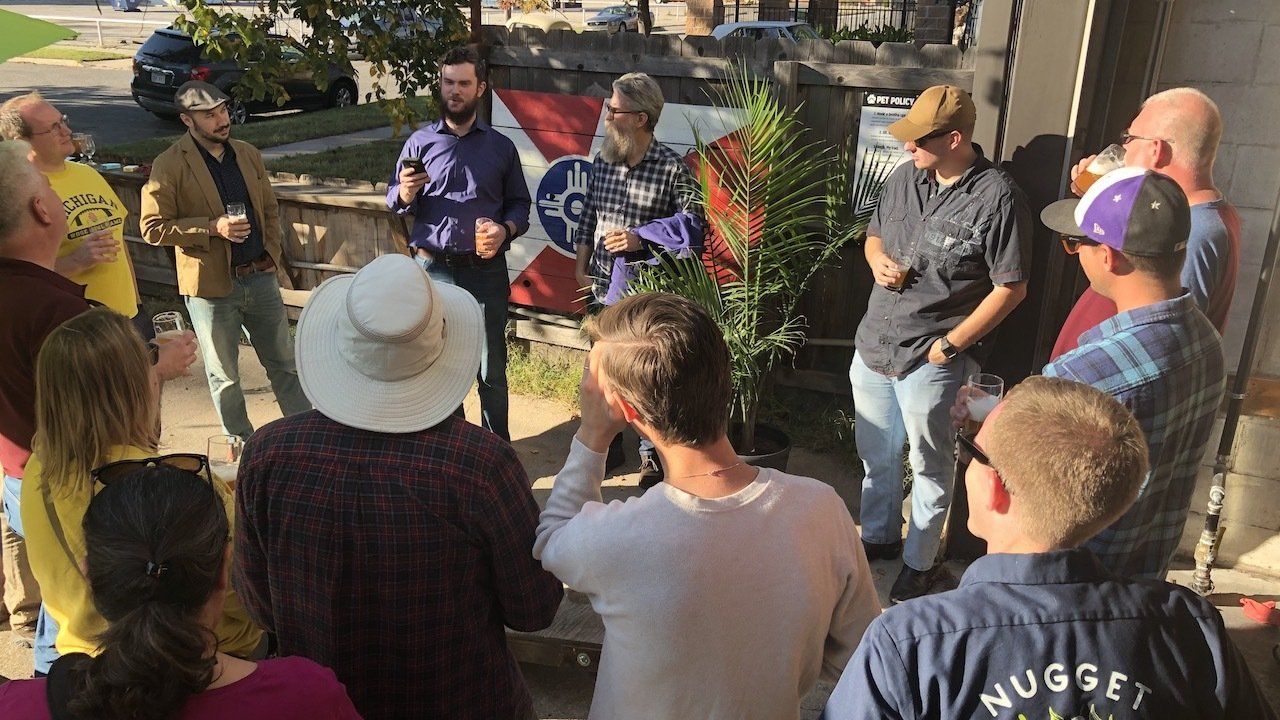Myth Made Fact: A Toast to the Inklings as Spell Breakers
by Richard Rohlin
Feast of St Dimitri, Metropolitan of Rostov
Anno Domini 2020, October 29

Richard Rohlin offering toast number three (see text below) at the 2019 Inklings Festival Walking Tour
On an early Sunday morning in September of 1931, three 30-something Oxford dons took a stroll together on Addison’s Walk in the grounds of Magdalen College. They were a 32-year-old C. S. Lewis, a 39-year-old J. R. R. Tolkien, and a 35-year-old Hugo Dyson. Their conversation had begun the evening before during dinner and had gone late into the night. Tolkien had left around 3 a.m., and Lewis and Dyson continued to talk until 4 a.m. before retiring in their rooms there at the college. The next day, Lewis wrote to his dear friend and long-time correspondent Arthur Greeves:
We began on metaphor and myth—interrupted by a rush of wind which came so suddenly on the still, warm evening and sent so many leaves pattering down that we thought it was raining. We all held our breath, the other two appreciating the ecstasy of such a thing almost as you would.
We continued (in my room) on Christianity: a good long satisfying talk in which I learned a lot: then discussed the difference between love and friendship—then finally drifted back to poetry and books.
Later in the letter, discussing the writings of William Morris and George MacDonald, Lewis said:
These hauntingly beautiful lands [of Morris's fiction] which somehow never satisfy—this passion to escape from death plus the certainty that life owes all its charm to mortality—these push you on to the real thing because they fill you with desire and yet prove absolutely clearly that in Morris’s world that desire cannot be satisfied.
The MacDonald conception of death—or, to speak more correctly, St Paul’s—is really the answer to Morris: but I don’t think I should have understood it without going through Morris. He is an unwilling witness to the truth. He shows you just how far you can go without knowing God, and that is far enough to force you . . . to go further.
Lewis’s letters to Greeves provide a valuable “inside look” at his conversion. What they reveal is something deeper than either intellectual assent or an emotional surge; it is a complete paradigm-shift, a new way of looking at the world through “mythic” eyes. When Lewis wrote to Greeves again the next month, he put it this way:
Now what Dyson and Tolkien showed me was this: that if I met the idea of sacrifice in a Pagan story I didn’t mind it at all: again, that if I met the idea of a god sacrificing himself to himself . . . I liked it very much and was mysteriously moved by it: again, that the idea of the dying and reviving god (Balder, Adonis, Bacchus) similarly moved me provided I met it anywhere except in the Gospels. The reason was that in Pagan stories I was prepared to feel the myth as profound and suggestive of meanings beyond my grasp even tho’ I could not say in cold prose “what it meant.”
Now the story of Christ is simply a true myth: a myth working on us in the same way as the others, but with this tremendous difference that it really happened.
Many years later, Lewis would write a poem called “What the Bird Said Early in the Year.” It is, not coincidentally, set on Addison's Walk, and it compares this paradigm-shift to a spell being broken—perhaps a spell of perpetual winter, broken forever by the coming of the King of the Wood:
I heard in Addison’s Walk a bird sing clear:
This year the summer will come true. This year. This year.
Winds will not strip the blossom from the apple trees
This year, nor want of rain destroy the peas.
This year time’s nature will no more defeat you,
Nor all the promised moments in their passing cheat you.
This time they will not lead you round and back
To Autumn, one year older, by the well-worn track.
This year, this year, as all these flowers foretell,
We shall escape the circle and undo the spell.
Often deceived, yet open once again your heart,
Quick, quick, quick, quick!—the gates are drawn apart.
Each of these three toasts has been to celebrate something of significance to the Inklings, something which they shared—humor, language, myth. But this final toast is to the one great Thing which binds all other things together. Glory to Jesus Christ, who breaks every spell, and makes every story come true! Cheers!!!
Contribute to Cultural Renewal by Sharing on Your Preferred Platform
In an isolating secularized culture where the Church's voice is muffled through her many divisions, Christians need all the help they can get to strengthen their faith in God and love toward their neighbor. Eighth Day Institute offers hope to all Christians through our adherence to the Nicene faith, our ecumenical dialogues of love and truth, and our many events and publications to strengthen faith, grow in wisdom, and foster Christian friendships of love. Will you join us in our efforts to renew soul & city? Donate today and join the community of Eighth Day Members who are working together to renew culture through faith & learning.









